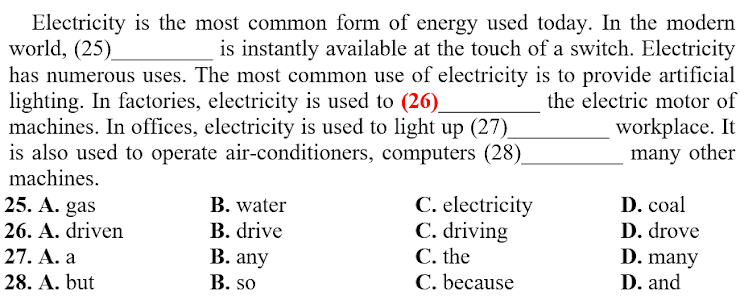Read the following passage and mark the letter A, B, C, or D to indicate the correct word or phrase that best fits each the numbered blanks.
In some sense, the way we manage our social connections on Facebook is no different from how we build relationships offline. The need for (25) ______ is one of the most basic motivations underlying social behavior. We use Facebook to maintain a positive social identity and satisfy needs for acceptance and social affiliation.
One study, conducted by researchers in New Zealand, looked into how people weaved Facebook into their daily lives. They were primarily interested in the social dimensions of Facebook, (26) ______ they divided into two categories: direct and indirect actions.
Direct actions include messaging, chat, wall posts, comments, photo tagging, and "likes." Indirect actions are those where an individual looks at a friend's profile or reads that person's status updates. Most Facebook users initiate a combination of direct and indirect actions when they use the website. Some do this quite (27) ______, with nearly a third of users (31%) posting daily status updates.
The social benefits of using Facebook to communicate with friends and build relationships are mixed. Researchers at Carnegie Mellon University and Facebook analyzed the server logs of more than a thousand Facebook users over a period of two months, and conducted a survey to ask users about how close they feel to their friends, and the frequency with which they make new social connections. They found that Facebook users who engaged (28) ______ greater direct actions (messaging, commenting) reported greater bridging (making new friends), social bonding, and self-esteem. (29) ______, users who had a record of more indirect actions and passive consumption (refreshing the news feed, reading friends' status updates and Viewing their profiles) reported more frequent feelings of loneliness and lower self-esteem.
Điền vào số (26)
A. which
B. where
C. that
D. who


Đáp án A
Kiến thức về đại từ quan hệ
Đại từ quan hệ “where" dùng để chỉ nơi chốn.
Đại từ quan hệ “ which, that” đều thay thế cho từ/ cụm từ chỉ vật. Tuy nhiên, khi trong câu xuất hiện dấu phẩy thì sau dấu phẩy không thể dùng “that".
Đại từ quan hệ " who” dùng để chỉ người.
Tạm dịch: "They were primarily interested in the social dimensions of Facebook, (26) which they divided into two categories: direct and indirect actions.” (Họ chủ yếu quan tâm đến các khía cạnh xã hội của Facebook, họ chia thành hai loại: hành động trực tiếp và gián tiếp.